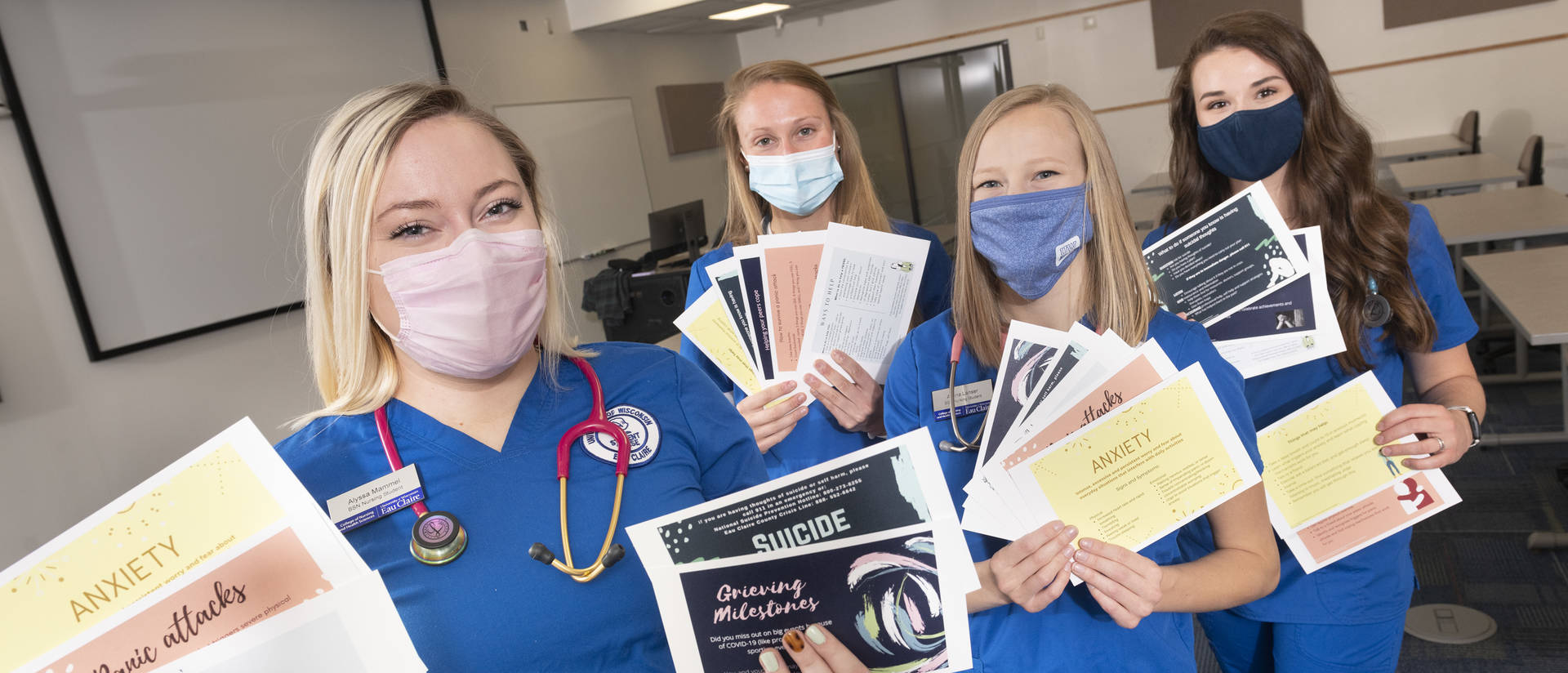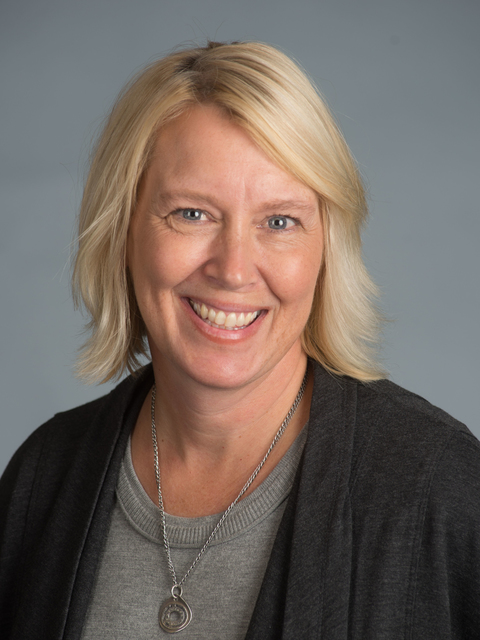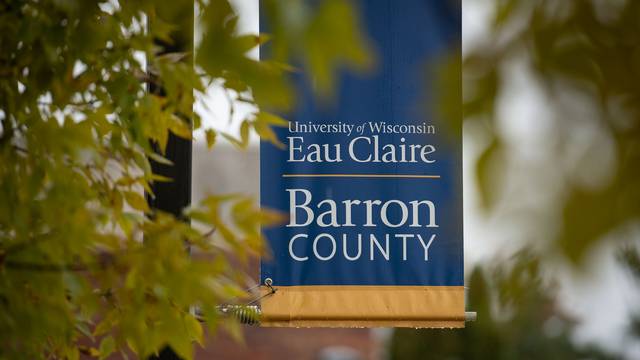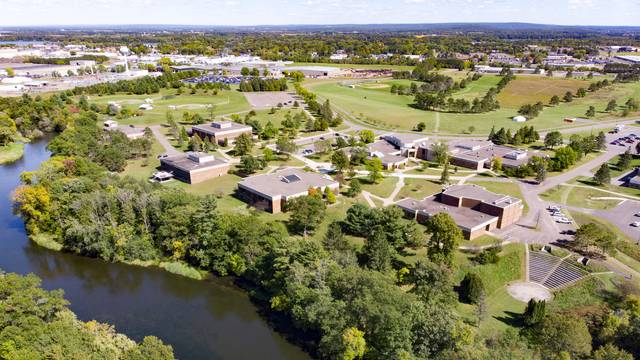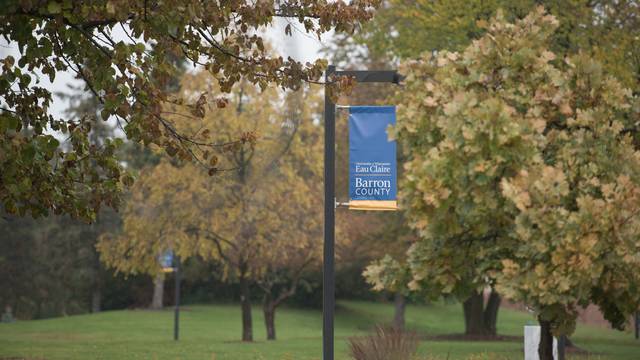Photo caption: A project launched this spring by a team of UW-Eau Claire nursing students is helping to get information about mental health disorders and mental health resources into the hands of young people across the state who need it as well as the adults who support them. Students involved in the project are (from left) Alyssa Mammel, Lizzy Keena, Alaina Lanser and Haley Kalal.
Plenty of research has shown that teens and young adults in the Chippewa Valley and beyond are struggling with their mental health, an issue made even worse by the COVID-19 pandemic.
A project launched this spring by a team of nursing students at the University of Wisconsin-Eau Claire is helping to get valuable information about mental health disorders and mental health resources into the hands of young people who need it as well as the adults who support them.
“We did research in Eau Claire County to determine the area of greatest need in the community, and we found there is a strong need and desire for mental health education and access,” says Alaina Lanser, a senior nursing major from Hartland. “We are excited to see the potential impact our project will have on the community. We hope it will address the community's mental health education needs and help make mental health care more accessible.”
Recipe cards
As part of a nursing leadership course, the Blugolds created five “recipe cards,” with each card describing a different aspect of mental health that teens may be struggling with today, says Lizzy Keena, a senior nursing major from Wisconsin Rapids.
The five topics addressed are depression, anxiety, panic attacks, suicide and grief due to missed milestones during COVID-19.
Each card — the size of a traditional recipe card — has information on the front and back sides that aim to help educate people about one of the mental health issues and possible coping strategies. The front side includes a definition of the topic along with common signs and symptoms. The back side provides healthy coping mechanisms and strategies for someone to use to help themselves or a friend.
“We created these mental health ‘recipe cards’ as a form of education that is easily accessible and relatable to the teen and young adult age group,” says Alyssa Mammel, a senior nursing major from Rochester, Minnesota. “The cards are intended to be something teens can casually grab for themselves or for a friend.”
They used recipe cards because they are a convenient size and easy to read, Mammel says. Since they wanted to address several mental health issues, they made separate cards for each topic.
Given the struggles of the past year, it was important to include a card on grief stemming from the pandemic, says Mammel, noting the topic was suggested by their community partners.
“The thought was to help teens and high schoolers to cope with missed events due to COVID-19,” Mammal says. “The rest of the cards focus on mental health issues our group chose because of what we see during our nursing care experiences or the mental health concerns we see in our peers.”
A valuable resource
While the cards were initially designed to meet the needs of UW-Eau Claire students and young people in the Chippewa Valley, they already are being used as educational tools throughout the state, says Dr. Pamela Guthman, an assistant professor of nursing who oversaw the group project. For example, the cards currently are highlighted on the state of Wisconsin's Office of Children's Mental Health website as part of its Child's Mental Health Awareness Week initiative.
Guthman says the cards are a valuable resource anytime, but especially now given the significant impact the pandemic is having on young people’s mental health.
“Given the challenges with the pandemic today, we know that the formative years of social-emotional growth and development is critically important for kids and especially teens,” Guthman says. “They need and seek social and emotional reinforcement about who they are as they explore various ideas and values all at the time of rapid growth of emotional regulation. Emotional regulation is also part of learning and incorporating ideas about their own self-worth and self-identity. The nursing students noted in their assessment data this age group was really struggling emotionally.”
The recipe cards are a way to directly help young people who are struggling and also to give the adults in their lives useful information and tools for supporting them, Guthman says.
“The students are providing health promotion messages and resources easily accessed by teens and others,” Guthman says. “They want people to know how to talk with one another about mental health concerns. Whether it is a friend talking to a friend, or if it is a teacher, parent, guidance counselor or another caring person who reaches out to a teen/youth, they need information and resources.”
If schools or other organizations print the cards and make them conveniently available, it will be easy for someone to "slip" a recipe card to their friend or to someone they care about, Guthman says.
The students are providing a tremendous service by creating a tool that will make it easier to make those connections, Guthman says.
“We need to showcase that we care about and for each other,” Guthman says. “Kids and teens need to have and feel this reinforcement to address the social isolation and challenges they have experienced during one of the most critically important developmental growth periods in their lives.”
Local partnerships, research
In creating the cards, the students worked closely with the Eau Claire City-County Health Department, says Haley Kalal, a senior nursing major from Hartland.
“The ECCCHD provided us with many opportunities and guidance,” Kalal says of the local public health officials. “We met with them every other week throughout the semester, and they discussed some community needs they felt needed to be addressed. They also provided feedback throughout the production process and assisted in dissemination of our project.”
The students completed a community needs assessment, which consisted of a survey, a review of existing research and communication with community partners, Kalal says. As part of their research, they reviewed the Eau Claire County Health assessment, a study completed in 2018 that determined that mental health should be a priority in Eau Claire County, she says.
Through their research, they learned that a significant number of community members are not comfortable seeking mental health services, don’t think affordable mental health treatment is available and do not believe they can easily access mental health services.
Keena says they also learned that an alarming number of teens and young adults have been hospitalized in Eau Claire due to mental health disorders.
“This information led our group to the conclusion that the teens and young adult population of Eau Claire would benefit from education regarding mental health,” Keena says.
Sharing information
To disseminate the recipe cards, the nursing students worked with various offices and organizations on and off campus, including Counseling Services at UW-Eau Claire, the Eau Claire Mental Health Committee, the Office of Children’s Mental Health and the Eau Claire Area School District.
They are continuing to share the cards as they identify new places and organizations that want them.
While they expected Counseling Services and the local health department to use the cards, the future nurses are pleased that other organizations also are eager to use them. For example, staff at the Augusta Public Library plan to include the cards in a mental health kit they are creating.
“Our group was surprised by how many organizations were interested in using our mental health cards,” Kalal says. “We had created them for our local community, but they already are being used at a state level. We are honored to be contributing toward local and state efforts to educate the public regarding mental health and healthy coping mechanisms.”
As a student, it is exciting to be part of a project that is attracting so much attention, Keena says.
“We worked very hard to develop materials we felt teens and young adults could really connect with and find helpful when addressing their mental health needs, especially during the pandemic,” Keena says. “It feels great knowing we are making a positive impact on our campus and in our community. We are very appreciative of all the positive feedback we are receiving.”
A learning experience
Lanser says the project has been a tremendous learning experience for all the students, with lessons learned that will benefit all of them in their future careers in health care. A key takeaway for the group was realizing the importance of teamwork and collaboration to meet an end goal, she says.
“We spent a lot of time discussing the best approach to address the mental health needs in the Eau Claire community,” Lanser says. “We regularly communicate with our community partners, who provide us with constructive feedback and the resources needed to finalize our project. Without partnerships and effective communication strategies, this project would have been difficult to complete.
“Effective team working skills are expected to be utilized in all areas of nursing, and we believe that this class and project have strengthened our abilities to work with others to achieve a desired outcome.”
The recipe card project is one of many real-world learning experiences they have had through their nursing studies at UW-Eau Claire, according to the students, all of whom will graduate in December.
For example, the Blugolds partnered with the Eau Claire City-County Health Department to provide COVID-19 vaccines at local immunization clinics.
“Helping to administer the COVID-19 vaccine to the community was a humbling experience as we had the opportunity to witness the excitement that many of the recipients felt as the vaccine meant they were one step closer to being able to see their loved ones again,” Lanser says.
A bright future in health care
The four students all say they came to UW-Eau Claire because of its reputation for excellent academic programs, including its well-known nursing program. Knowing they would have opportunities to engage in projects and experiences outside of the classroom also was a draw.
Their experiences have exceeded their already high expectations and have given them confidence that they are working toward a future career that is right for them, the students say.
Keena came to college knowing she wanted to be a nurse but the many experiences she has had at UW-Eau Claire have helped her find her niche within the profession.
“I came to college wanting to work with the geriatric population, but I now see my interests shifting to an ER or ICU setting,” Keena says.
Mammel says she also has shifted her thinking about her future thanks to UW-Eau Claire’s nursing program.
“When I was first touring the university, I was interested in majoring in kinesiology,” Mammel says. “Once I learned more about UWEC and the nursing program, I knew that nursing was the right path for me.”
